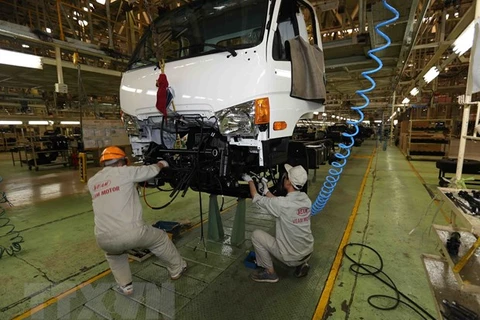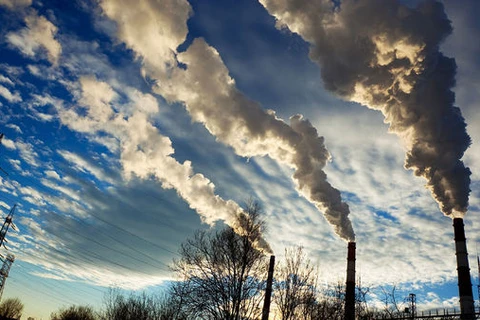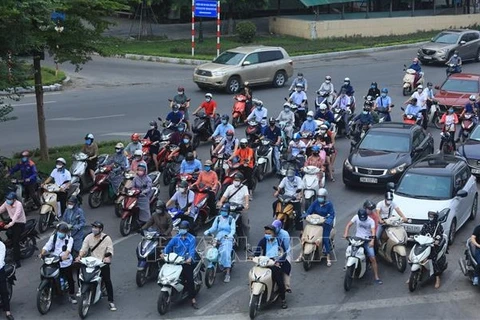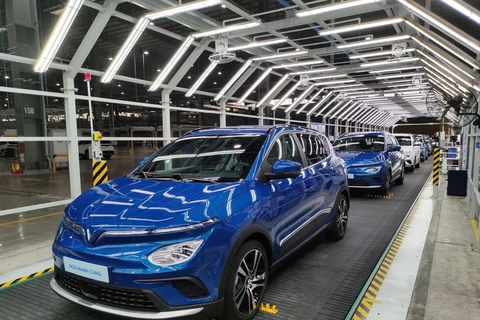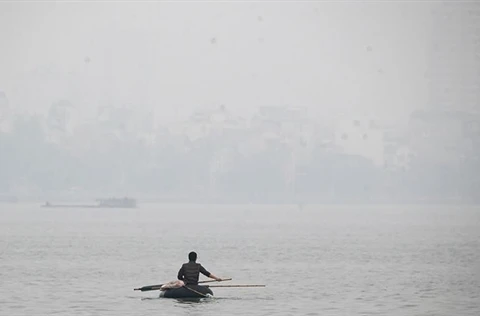Hanoi (VNA) — According to experts, if Vietnam does not take drastic action soon, pollution will have long-term health consequences for future generations, such as reduced life expectancy and increased medical burden.
The national environment report in the 2016-20 period stated that each year, Vietnam records over 20,000 cases of lung cancer.
Hoang Duong Tung, chairman of the Vietnam Clean Air Partnership, told Vietnam News Agency that dust pollution is a major problem in many cities, causing significant air pollution. In large northern cities such as Hanoi, about 30.5% of the days have poor or bad air quality index (AQI) levels.
On several days, the AQI declines to a very bad level, which is 201-300.
Tung said that there are many reasons for air pollution in Vietnam, including straw burning after rice harvest, traffic, construction, industrial manufacturing, and traditional village practices. Recently, fine dust pollution has been particularly high in cities due to the large number of vehicles on the roads.
“The more cities develop, the more construction works, industrial parks and factories are built. Materials such as cement, soil, scrap, emissions, and low awareness of businesses and people about environmental protection have increased fine dust causing air pollution,” said Tung.
He proposed several solutions to address the issue of air pollution, including strengthening emission controls for cars and motorcycles, promoting the use of clean fuel vehicles, electric cars, and electric motorcycles. He also suggested encouraging the use of public transportation such as buses, trams, and metro to reduce the number of vehicles on the road. In addition, local authorities need to better control garbage burning, construction activities, and industrial production processes to reduce air pollution.
Nguyen Hung Thinh, deputy director of the Vietnam Environment Administration under the Ministry of Natural Resources and Environment (MONRE), said that to limit air pollution, it is important to perfect the system of policies to manage air quality.
Local authorities need to inspect and strictly punish individuals and organisations that cause dust pollution. They should also implement hygienic waste treatment methods and encourage people to stop using traditional coal stoves by 2030.
Thinh said that after the Law on Environmental Protection was issued in 2020, many decrees and other regulations have been promulgated by the government and the MONRE to establish a legal framework for environmental protection.
In particular, the Government's Decree 08 allows for urgent measures to be taken in the case of serious air pollution, depending on its scale and severity. For example, authorities can temporarily suspend or adjust the working hours of production facilities that emit high levels of dust and gas into the environment.
They can also limit or ban vehicle entry into provinces and cities, and suspend the operation of organisations, schools, and crowded outdoor activities./.
The national environment report in the 2016-20 period stated that each year, Vietnam records over 20,000 cases of lung cancer.
Hoang Duong Tung, chairman of the Vietnam Clean Air Partnership, told Vietnam News Agency that dust pollution is a major problem in many cities, causing significant air pollution. In large northern cities such as Hanoi, about 30.5% of the days have poor or bad air quality index (AQI) levels.
On several days, the AQI declines to a very bad level, which is 201-300.
Tung said that there are many reasons for air pollution in Vietnam, including straw burning after rice harvest, traffic, construction, industrial manufacturing, and traditional village practices. Recently, fine dust pollution has been particularly high in cities due to the large number of vehicles on the roads.
“The more cities develop, the more construction works, industrial parks and factories are built. Materials such as cement, soil, scrap, emissions, and low awareness of businesses and people about environmental protection have increased fine dust causing air pollution,” said Tung.
He proposed several solutions to address the issue of air pollution, including strengthening emission controls for cars and motorcycles, promoting the use of clean fuel vehicles, electric cars, and electric motorcycles. He also suggested encouraging the use of public transportation such as buses, trams, and metro to reduce the number of vehicles on the road. In addition, local authorities need to better control garbage burning, construction activities, and industrial production processes to reduce air pollution.
Nguyen Hung Thinh, deputy director of the Vietnam Environment Administration under the Ministry of Natural Resources and Environment (MONRE), said that to limit air pollution, it is important to perfect the system of policies to manage air quality.
Local authorities need to inspect and strictly punish individuals and organisations that cause dust pollution. They should also implement hygienic waste treatment methods and encourage people to stop using traditional coal stoves by 2030.
Thinh said that after the Law on Environmental Protection was issued in 2020, many decrees and other regulations have been promulgated by the government and the MONRE to establish a legal framework for environmental protection.
In particular, the Government's Decree 08 allows for urgent measures to be taken in the case of serious air pollution, depending on its scale and severity. For example, authorities can temporarily suspend or adjust the working hours of production facilities that emit high levels of dust and gas into the environment.
They can also limit or ban vehicle entry into provinces and cities, and suspend the operation of organisations, schools, and crowded outdoor activities./.
VNA

